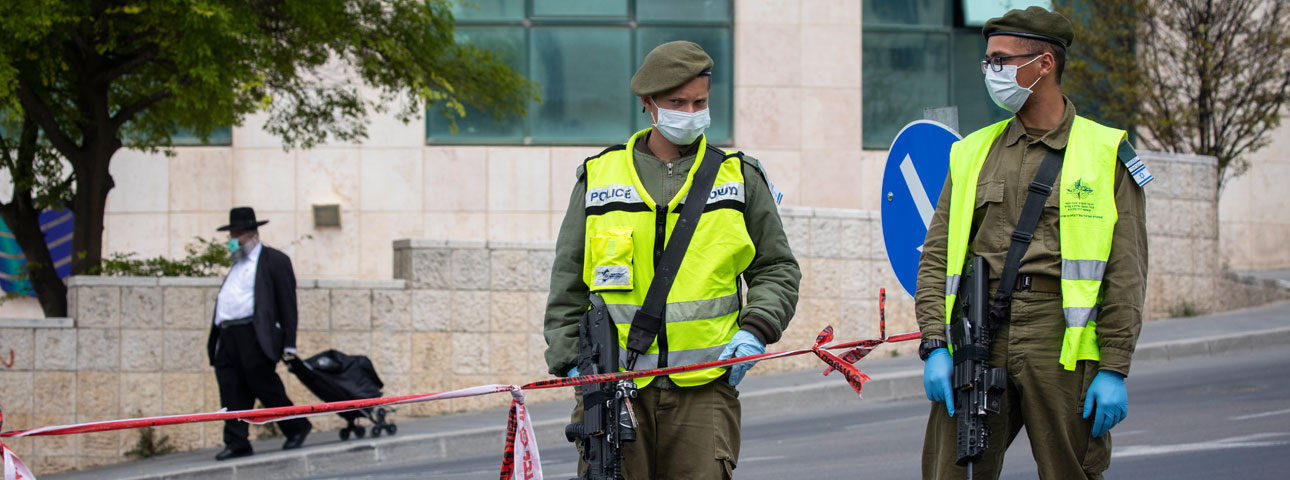Don’t Let the IDF Sink into the Coronavirus Quicksand
The decision to call in the IDF is dealing a double blow to the country - it is both ineffective and is damaging the public’s trust in the IDF

Flash 90
Once again, the IDF finds itself the epicenter of public criticism. This began long before social media platforms were flooded with clips of Israeli women reprimanding paratroopers who—unwisely—were sent to back up police officers enforcing Covid-19-related restrictions at protest sites. The issue this time is the national disappointment at the inability of the most powerful military in the Middle East to defeat the coronavirus. The Israeli public can stomach with many things—political considerations getting mixed up in professional decisions, paralyzing levels of bureaucracy, dysfunctional public systems, and even injustice in the distribution of the country’s resources. But failures of the IDF, the people’s army, are too bitter a pill to swallow for a people used to calling in its generals to put out any and all burning fires.
“Let the IDF limp along” (a play on the popular slogan, “let the IDF win”) was the headline of an article aimed at explaining the failure of the Alon Command Center set up by the IDF Home Front Command to help break the chains of infection. “Why has the IDF not (yet) defeated the virus?” was the query of another article on the same subject. And so, alongside the devastating harm inflicted by the pandemic, we are seeing secondary damage in the eating away of the public’s trust in the IDF-- the last state institution that still enjoys the trust of the Israeli public.
As was the case in the Yom Kippur War, the current ambiguity as to the division of authority is being cited as a possible source of faults and failures. Just like in 1973, the feeling now is that the enemy has caught Israel unprepared; and once again, the specter of a public commission of inquiry is already in the air, which promises to be an exchange of accusations between the political leadership (headed by the Ministry of Health) and the military.
However, while there is always room for constructive criticism of the military, we should bear in mind several fundamental principles that seem to have fallen by the wayside in the wake of the national hope that all we have to do is stay safe in our shelters—or in this case, in our sequestered quarantine spaces—until the pictures of a triumphant IDF victory are released to the world.
First it must be stressed that it is only natural to turn to the military in times of emergency, which these indeed are. Thus, though the pandemic is not a security crisis, taking advantage of military capabilities to perform various tasks is perfectly understandable. However, this is exactly how such involvement should be seen: the IDF is involved because it has been asked to help, but not to lead the overall effort against the pandemic. The overarching goal is to train civilians to carry out those tasks that were supposed to be handled by civilian systems, which have been unable to do so. The IDF is merely an interim and stopgap solution, not a magic remedy. Moreover, we should be asking why, in an economy with over one million unemployed, the country should be calling up reservists to a command center tasked with breaking viral transmission chains, a task that is totally unrelated to military activities.
The hurried decision to call in the IDF, coupled with public expectations of a knockout victory, is dealing a double blow to the country. First, it is taking a heavy toll on the IDF, which cannot meet expectations and faces a stark choice between destroying the public’s trust in it or pointing an accusatory finger at the political leadership, and by doing so—to getting dragged into dangerous politicization. And at the same time, it is also exacting a high price from Israeli society, which does not always see the problem in assigning paratroopers—charged with defending Israel’s citizens from foreign enemies—to enforce regulations against those very same citizens, some of whom then accuse them of collaboration with the politicians.
The sense of overall panic gripping the public must not be allowed to affect the way in which the IDF is deployed in the struggle against the coronavirus. Even during emergencies there are basic principles that must be upheld. The military should only be used as a last resort; soldiers should not participate in civilian enforcement activities; and the IDF should refrain from taking overall responsibility for managing events that are civilian in nature.
These principles may not conquer the pandemic (and without effective, functioning civilian systems to manage the crisis, even the IDF would find it difficult to do so) , but they will minimize the danger that when the crisis is over, we find ourselves sinking deep into quicksand, that while not in enemy territory, is no less dangerous.
The article was published in the Jerusalem Report/Post.
